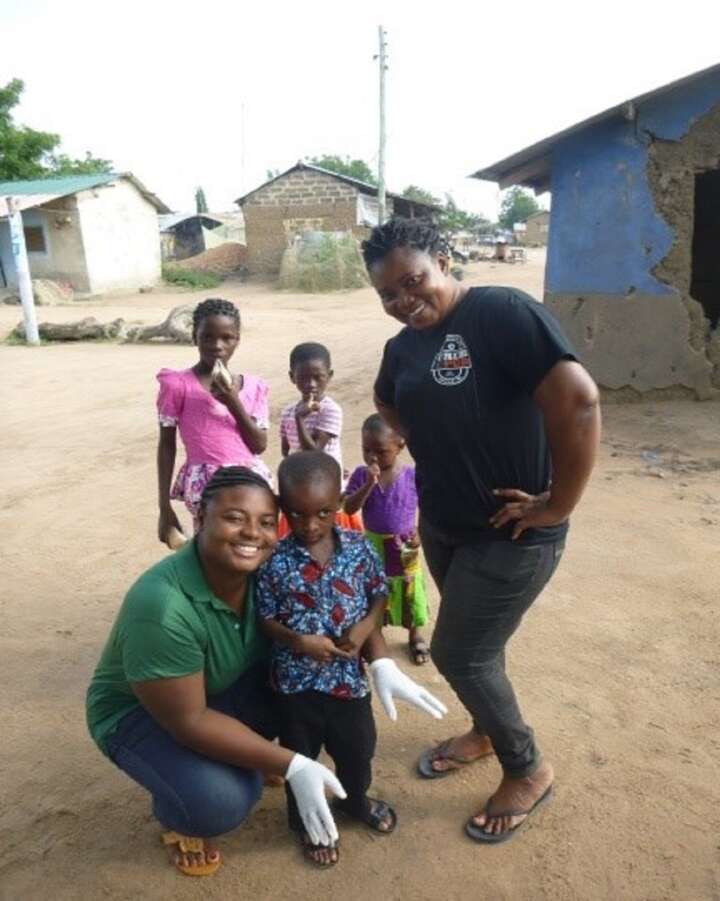
By Pamela Selormey (Research Technologist and a Research Ethicist at Council for Scientific & Industrial Research – CSIR)
Schistosomiasis and soil-transmitted helminthiasis (STH), two neglected tropical diseases (NTDs) that are stubbornly prevalent in Ghana, are contracted through exposure to contaminated water and soil where parasites are present. The WHO fact sheets on these diseases call schistosomiasis an “acute and chronic disease … causing immune reactions and progressive damage to organs”, and describe that children infected with STH become physically and intellectually impaired. It is no coincidence that poor communities, lacking infrastructure and weighed down by unstable and seasonal livelihoods, suffer disproportionately from schistosomiasis and STH.
The COUNTDOWN project seeks to develop and improve upon current strategies to fight these diseases, with the hope of eliminating them completely. As part of the COUNTDOWN research team, I participated in fieldwork in communities that suffer from high incidence and prevalence of these “neglected” diseases. This prompted me to explore the challenges of working with extremely vulnerable communities, and the obligations we, as researchers, have towards them.
Researching Community-Wide Expanded Treatment
School-aged children are routinely treated with preventive medicine during annual campaigns called mass drug administration (MDA). During MDA, teachers and volunteers give medicine to pupils. However, pre-school-aged children and adults are also at risk, particularly in areas that lack adequate sources of clean water and latrines or other sanitation infrastructure. COUNTDOWN tested community-wide expanded access to treatment, providing praziquantel and albendazole treatment for most people in the community, from toddlers to elders. Our study assessed infection prevalence of schistosomiasis and STH, and environmental risk factors. Fieldwork took place in four communities in Ga-South municipality of Greater Accra region in Ghana (Manheam, Tomefa, Torga-kope and Ada-kope). Participants provided stool and urine samples for parasitological and molecular diagnosis of parasites to determine the prevalence of infections in all four communities before and after treatment.
Community Vulnerability
When our research team arrived, I saw that the common livelihoods of people were fishing for men, selling fish (fresh, fried, smoked or salted) for most women, and some petty trading or small-scale farming. The average educational background was senior high school with a very high number of out-of-school children, mostly due to lack of money. The main source of water for these communities for cooking, washing, bathing and drinking, is the Weija Dam reservoir. Both animals and people depend on the reservoir for water. Waste disposal and latrines in households and schools are inadequate; one latrine can be shared by three or four households. Others do resort to the bush and the Weija Dam reservoir for such purposes. Sanitation is a major problem.
In this study, we provided a biscuit (or cookie) to participants when they presented their stool and urine samples. This small incentive was a token of appreciation for their willingness to participate. I observed that after providing their own sample, some children were giving us their mom or dad’s sample container. “Can I have another biscuit?” they would ask, beaming up at us. Of course, we gladly gave them biscuits, but the data quality team had to take great care that these samples were from the correct participant. This scenario was repeated in all four communities we studied.
In hindsight, I am not surprised that these sweet little kids wanted more treats. Still, the scenario raised several questions in my mind: Was the incentive we gave in line with established ethical guidelines? Should we be thinking differently about research incentives where children are concerned? Above all, how can we protect the quality and integrity of research while also protecting and caring for the communities that are generously participating in it for the greater good?
Conducting Research with Respect and Integrity
Let’s consider the question about the biscuit incentive. A review of the various ethical guidelines reveals no prescribed standards for differentiating between ‘due’ and ‘undue’ incentives. There are, however, some common elements of undue inducement, including:
- Undermining voluntariness
- An offer that one cannot reasonably refuse
- Leads to a decision against one’s better judgment
- Assumes substantial risk that compromises one’s welfare
- Causes participants to lie or conceal information that would exclude them from participating
When applying the elements above in vulnerable communities and with children, serious care must be taken. In the case presented above, household food insecurity likely played a role in the children’s behaviour and how they viewed the biscuit. I would like to sound a word of caution to researchers and Institutional Review Boards (IRBs) to consider the local context of any proposed research. In highly vulnerable communities, this might need to extend beyond a consideration of the item’s value in terms of currency. I am sure other researchers can very much relate to this scenario. A case-by-case compilation of similar scenarios and how they were handled could also help sharpen policy.
What can researchers do to acknowledge and appropriately address the power imbalance that exists between them and local communities where they conduct fieldwork?
Working with vulnerable communities in low-income countries means asking for their trust and pledging to be worthy of it. Based on the lessons I learnt on the COUNTDOWN project, I offer the following recommendations that can be adapted and applied to other contexts:
- First, awareness of the economic power of the local area should guide research design and the selection of incentives.
- Second, scientists should think through how and when they give incentives.
- Third, community leaders should be consulted about the procedures of community-based research, including incentives and their distribution.
If you have experience working in highly vulnerable communities, what challenges did you encounter? Share with us on Twitter: @ntdghcountdown and @NTDCOUNTDOWN.
(Edits by Tori Lebrun)
